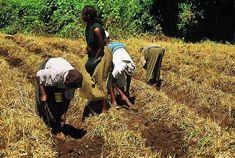
View from the industry
Avenue Fresh Produce is a producer and exporter of fresh fruits and vegetables based in Kenya.
Avenue Fresh exports around 600,000kg of fresh produce to the EU every year, mainly loose and pre-packed fine beans and mange-tout and some passion fruit.
The company has farms of its own spanning some 155 acres but like many other fruit and vegetable growers in Kenya it relies to a large extent on outgrowers for an important part of its supply of produce.
The 230 growers it works with, located in different regions across the country, have small to medium-sized plots with the ability to plant anywhere from 1kg to 50kg of seeds.
“We are at a crossroads,” says Charles Muchiri, managing director of Avenue Fresh. “The outgrowers we work with are not well trained and we don't know whether or not to continue working with them. If somebody helped us to train them and sensitise them on the requirements of our consumers I would love it.
“230 outgrowers is a lot of people to deal with,” he adds. “I have an agronomist who works with them to guide them in growing a crop.”
Despite having the expertise of a specialist in agriculture to help farmers in the production process Avenue Fresh is having a hard time co-ordinating all its activities. Even if he is planning to set up technical teams to provide them further support, Muchiri has been wondering whether he should continue working with them or find another solution.
PIP providing much needed support
“Whatever Kenya does, it does a very good job at it,” remarks Hasit Shah, chairman of the Fresh Produce Exporters Association of Kenya (FPEAK), the professional organisation which represents producers of fruits and vegetables.
“Kenyan producers are very competent, hard working and they get a nice quality product out. They dominate the world market in French beans and roses, but to increase their production Kenyan farmers need a bit of support.”
Indeed, the main issues facing Kenyan growers are problems of cashflow, inputs and credits. The growers not only find it difficult to expand their operations but they are hard put when it comes to meeting the increasingly stringent food safety requirements imposed on foreign exporters by regulatory authorities and retailers in the UK and the rest of the EU.
To alleviate some of these issues a programme was set up in 2001 to assist fruit and vegetable growers from African, Caribbean and Pacific countries (ACP countries) in dealing with EU food safety regulations. This programme, known as the Pesticide Initiative Programme (PIP) is an EU-funded project that is administered by Coleacp, the trade association of ACP produce exporters.
Avenue Fresh applied for PIP support in February 2002 and signed a protocol in January 2003. Its primary concern is to have the assistance of PIP in setting up a training programme for its outgrowers so that they may better understand the requirements of their customers and be aware of the safety risks in the different steps of the food production process.
Having outgrowers versed in topics such as traceability and food safety is important for Avenue Fresh as it will facilitate the company's aim to become certified with either EurepGAP or BRC quality standards.
Other growers in Kenya face a similar situation. “Basically, we need the training, that's what we're really after. We need to be sure that we are doing the right thing,” says Simon Maina, the ceo of Myner Exports Ltd, a Kenyan producer and exporter of French beans, snow peas, passion fruit, and sugar snap peas.
“We tried to set up a training programme on our own but when the PIP came into being we were happy to receive some much needed help in order work towards compliance with EU regulations and quality standards such as HACCP and EurepGAP.”
PIP in Kenya
Since the start of PIP two years ago, Kenyan companies have been particularly active in the life of the programme.
PIP experts have conducted more than 10 missions to Kenya between November 2001 and June 2003 to present the programme to interested companies and help producers and exporters put in place traceability and food safety systems.
Of nine protocols signed with Kenyan organisations ñ as of August 2003 ñ seven were with producers and exporters of fruits and vegetables, representing a total of nearly 34,000t of produce a year.
The service provider DUDUTECH and FPEAK have also signed co-operation protocols.






No comments yet